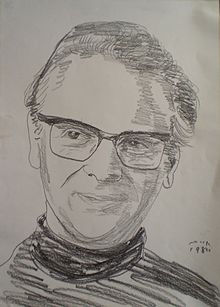Ephraim Kishon
Ephraim Kishon (Hebrew: אפרים קישון: August 23, 1924 – January 29, 2005) was a Hungarian-born Israeli author, dramatist, screenwriter, and Oscar-nominated film director.After the war when he returned to Budapest he discovered that his parents and sister had survived, but many other family members had been murdered in the gas chambers at Auschwitz.In 1948 he completed his studies in metal sculpturing and art history and began publishing humorous articles under the name Franz Kishunt.In 1981, Kishon established a second home in the rural Swiss canton of Appenzell as he felt unwelcome in Israel due to his status as an immigrant.Kishon initially lived in the "Sha'ar Ha'Aliyah" transit camp near Haifa, and soon afterwards moved to Kibbutz Kfar Hahoresh, in which he worked as a nurse while learning the Hebrew language during his free time with the help of his neighbor Joseph Bilitzer.Mastering the Hebrew language with remarkable speed, in 1951 Kishon began writing a satirical column in the easy-Hebrew daily, Omer, after only two years in the country.Later on Kishon began writing for the newspaper "Davar" (which was very influential at the time) in which he published a satire called "The Blaumilch Canal".In 1952 Kishon began writing a regular satirical column called "Had Gadya" ("One Young Goat" in Aramaic, taken from the Passover Seder liturgy) in the daily Hebrew tabloid "Ma'ariv".Lot (1960), Noah's Ark, Tourist Class (1962), The Seasick Whale (1965), and two books on the Six-Day War and its aftermath, So Sorry We Won (1967), and Woe to the Victors (1969).






BudapestAppenzellSara KishonHebrewdramatistscreenwriterfilm directorsatiristsYiddishjewelry makingWorld War IIconcentration campsSobibor extermination campChaim Topolgas chambersAuschwitzimmigratedCommunistJewish AgencyMount Carmeldivorceright wingYitzhak Rabincardiac arrestTrumpeldor CemeteryKfar HahoreshÚj KeletAvigdor HameiriPassoverMa'arivAachenWest GermanySix-Day WarVladimir KramnikHolocaustFriedrich Torbergchess-playing computersKafkaesqueSallah Shabatinominated for Oscar for best foreign language filmFiddler on the RoofErvinkaBlaumilch CanalThe PolicemanThe Fox in the Chicken CoopShaike OphirSeffy RivlinSokolov Prize for JournalismHerzl AwardBialik PrizeHebrew literatureIsrael PrizePalestiniansthe settlersAcademy Award for Best Foreign Language FilmGolden GlobeList of Bialik Prize recipientsList of Israel Prize recipientsWayback MachineInternet ArchiveGoogle Books